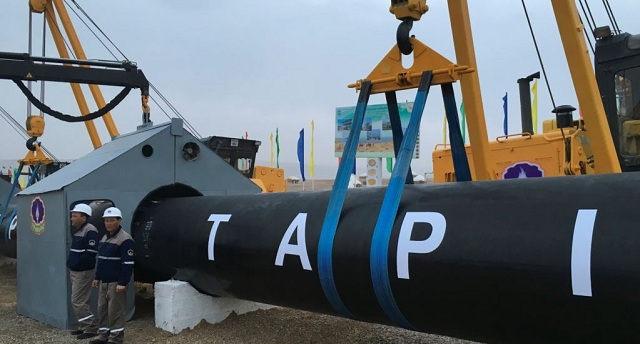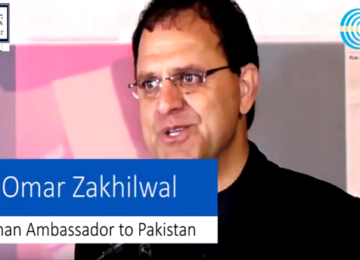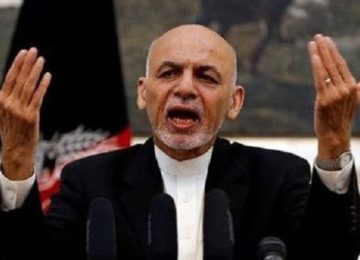Turkmenistan, Afghanistan, Pakistan and India (TAPI) have finally given green light to the long awaited TAPI gas pipeline project. On Friday, representatives from all four countries attended the ground breaking ceremony of the project in Serhetabad, followed by another ceremony in Herat. The pipeline, which signals the beginning of a major regional cooperation project, would be 1840 km in length and cost a total of $8 billion over a period of two years of its completion. The pipeline boasts the capacity of pumping 33 Billion cubic metres (Bcm) of natural gas from Turkmenistan. The project also helps Turkmenistan reduce its dependence on China and open other major Asian markets for gas exports.
Regional experts have always looked at the project through a sceptical outlook especially due to major security risks posed by the Taliban in Afghanistan. However, the militant group, in a statement to the media, has vowed to protect the project citing its importance to the Afghan economy as a major reason. Qari Mohammad Yusuf Ahmadi, a purported Taliban spokesperson, not only claimed credit for the project and its initiation during the Taliban regime, but also ensured his group’s support for the project.
“The Islamic Emirate views this project as an important element of the country’s economic infrastructure and believes its proper implementation will benefit the Afghan people. We announce our cooperation in providing security for the project in areas under our control,” the Taliban statement said, which was emailed to various media outlets.
Experts believe that the project also boasts potential of regional prosperity and peace, especially for Afghanistan; a country haunted by decades of civil war and violence. Renowned academic and expert on the Af-Pak region Barnett Rubin, in one of his piecesin 2015 on TAPI project, wrote the following on the prospects of the project:
“When (and if) completed, the pipeline will carry thirty-three billion cubic metres of natural gas per year from Turkmenistan, through Afghanistan and Pakistan, to India. Optimistically scheduled to be completed in 2019, tapi could earn Afghanistan four hundred million dollars a year in transit fees, as well as meeting enormous energy needs in Pakistan and India. Kabul may benefit even sooner from the power-transmission lines of a project named casa 1000, scheduled to open in 2017, which will bring hydropower from Tajikistan and Kyrgyzstan over Afghanistan’s mountains to Pakistan. As Ghani himself observed, social-media posts with the hashtag #TAPI, in English, Pashto, and Dari, welcomed the project and showed celebratory events across the country. Logar province, just south of Kabul, inaugurated a “tapi Park” in the provincial center of Pul-i-Alam. The government organized most of these events, but it could not have done so if their message had not coincided with a public mood”.
Indian involvement in the project has also raised doubts in the past considering New Delhi’s relationship with Islamabad. However, India’s minister for external affairs attending the ground-breaking ceremony called the project a ‘symbol of India’s goals’, and a ‘new page in cooperation’ between the four countries involved in the project.
Pakistani Prime Minister Abbasi also said that the TAPI gas pipeline project would ‘unite people, boost socio-economic development and bring in peace dividends to the entire region. TAPI would provide Pakistan the much needed gas security, as it would help meet 10 per cent of Pakistan’s energy needs, 20 per cent of its natural gas requirements’. Mr Abbasi also assured the Turkmen, Afghan and Indian leaders of Pakistan’s full cooperation in making TAPI a success.
Originally published on CRSS blog.
© Center for Research and Security Studies (CRSS) and Afghan Studies Center (ASC), Islamabad.








